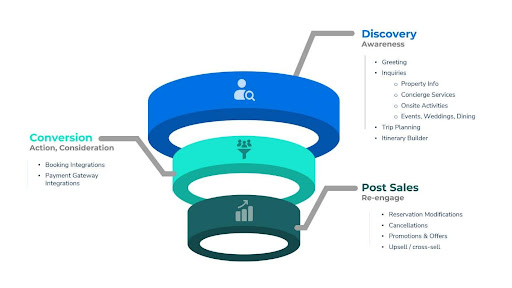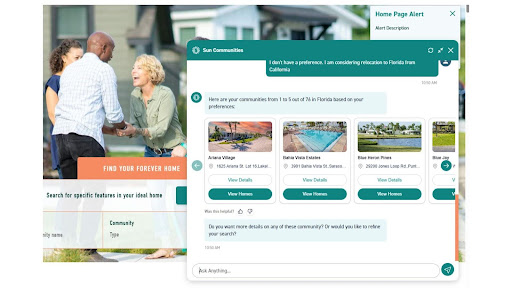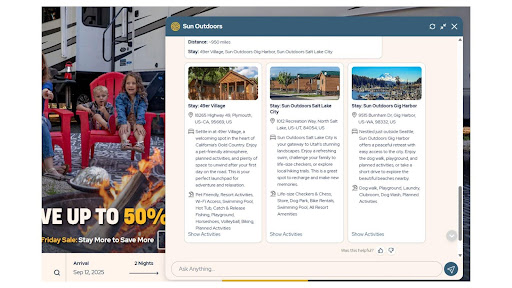Your website isn’t ready for AI agents — here’s what needs to change
Most websites aren’t built to support the seamless, personalized agent-drive experiences customers now expect.
The customer journey from discovery to conversion is now a quirky and eccentric one, shaped by personal idiosyncrasies like channel preferences, mood and the ever-changing level of interest. AI agents now make it possible to meet the customer wherever and whenever they want.
AI agents already drive one-third of brand-related search traffic, new BrightEdge data found. What customers see about your business depends on what the agent finds and chooses to surface, making information consistency critical.
Dig Deeper: From search to answer engines: How to optimize for the next era of discovery
The challenge is that the large language models (LLMs) powering enterprise AI struggle with complex workflows, unstructured proprietary data, siloed systems and strict compliance requirements. They’re not built to deliver accurate, context-rich responses at enterprise scale.
To bridge that gap, websites need to evolve into data hubs that feed consistent, structured content across channels and touchpoints.
Websites must evolve for agentic experiences
Tools like Google’s AI Overview make search an intelligent, personalized experience. Soon, users will expect websites to do the same — anticipating their needs and reducing the effort required to research, plan and make decisions.
Dig Deeper: From search to AI agents: The future of digital experiences
Doing this consistently on a large scale isn’t easy. Human-led processes break under volume, and silos fragment the experience. The hidden costs are high — lost knowledge, missed opportunities and weakened loyalty.
While AI agents are supposed to reduce friction and deliver unified experiences at scale, not all agents are created equal. Businesses have two options when implementing AI agents: horizontal agents and vertical agents.
Horizontal agents: The generalists
Tools like Gemini or ChatGPT work across industries and can surface information, but they have limits.
- Lack of depth: They struggle with industry nuances.
- Lack of context: Every brand is unique, and generalists often miss that detail.
- Technical limits: Even with retrieval-augmented generation (RAG), they stitch together answers from predefined knowledge bases, often resulting in disjointed outcomes.
Generalists handle basic Q&A but rarely anticipate needs, personalize effectively, or drive outcomes like leads and conversions.
Vertical agents: The specialists
These are built for specific industries and business use cases. Trained on your products, policies, and brand voice, they evolve as the business grows.
Unlike generalists, vertical agents deliver context-rich, brand-aligned, and outcome-driven experiences — from discovery and qualification to conversions, upsells, and loyalty. They function as true digital representatives of the brand, maintaining consistency across every touchpoint.
With advances in multi-agent frameworks, orchestration layers, vector databases, and cloud-native infrastructure, the brittle, rule-based bots of the past — prone to breaking when conversations strayed from scripts — have evolved into enterprise-grade agents capable of meeting these expectations at scale.
Payoffs from a well-designed AI agent
When designed well, AI agents reduce friction and deepen loyalty. The results can be seen in how well they handle omnichannel interactions and personalization.
Omnichannel personality
A single agent can engage customers across your website, app, social platforms and messaging channels. Voice and style remain consistent, while information shared on one channel is carried over to the next.
The payoff: Less friction, greater efficiency, and a seamless, interconnected experience.
Dig Deeper: Integrating SEO into omnichannel marketing for seamless engagement
Hyper-personalization
Well-designed agents integrate deeply with systems like CDPs, CRMs, and booking engines. They track customer history, loyalty status and preferences, adapting in real time. Each interaction sharpens their knowledge, evolving experiences from personalized to hyper-personalized.
The payoff: Stronger engagement, customer delight, and lasting loyalty.
Dig Deeper: How to boost your marketing revenue with personalization, connectivity and data
Orchestrating the customer journey with AI agents
AI agents deliver the most value when aligned with the entire customer journey—not just used for one-off tasks. In hospitality, that means supporting every stage: from discovery and booking to the stay itself and follow-up after checkout.

- Discovery: Agents help travelers plan trips, explore destinations, and build itineraries by surfacing relevant events, activities and offers.
- Conversion: Agents integrate with booking engines to answer availability questions, apply promotions and simplify reservations.
- Experience: Agents personalize on-site interactions, recommending dining, activities or upgrades based on guest history and preferences.
- Post-purchase: Agents sustain engagement after the stay by offering loyalty benefits, sending benefit reminders and suggesting repeat visits.
When AI agents are connected across the entire customer journey, they can deliver innovative, seamless experiences. That means fewer irrelevant messages, less friction and more timely, personalized interactions—leading to smoother journeys, lower drop-off rates and higher conversions.
Dig Deeper: How AI agents are revolutionizing digital marketing
Industry use cases for vertical AI agents
Hospitality

When a guest lands on a hotel site, the agent connects to the CDP to gather information, identify persona and anticipate intent. It surfaces relevant offers in real time.
- Anonymous visitors: Highlight pet-friendly stays, family packages, dining options, and activities to plan during their stay.
- Logged-in or returning guests: Offer reservation changes, stay extensions, and updated recommendations — recalling past visits, preferences, and loyalty rewards.
The effect is memory at scale, creating a “personal concierge” experience.
Financial services

When a prospect asks about savings accounts, the AI agent uses personal data and past interactions to anticipate what they’ll want to know. It then responds with clear, structured information—like APY, fees, and eligibility—making it easier for the customer to take the next step.
- Loan explorers: Guided through workflows that capture intent, pre-qualify instantly, and set up meetings.
- Returning customers: Receive tailored follow-ups, updated rates, pre-approved offers, and next steps.
The agent behaves like an advisor, not a chatbot, strengthening engagement, trust, and loyalty.
Case study: Outdoor hospitality brand

At an outdoor hospitality brand, we implemented a supervisor multi-agent framework to streamline guest interactions. When a guest asked, “What family activities are available this weekend and can I book a cabin near the lake?” the system coordinated multiple agents:
- Supervisor agent: Interpreted intent and routed the request.
- Q&A agent: Answered general property questions.
- Events agent: Surfaced weekend activities like BBQ nights and guided hikes.
- Trip planning agent: Suggested itineraries using mapping and scheduling tools.
- Booking agent: Checked cabin availability and completed the reservation.
- Lead collection agent: Passed references to the CRM for follow-up.
The result: guests transitioned seamlessly from discovery to booking in a single conversation. The brand reduced drop-offs, captured more leads, and achieved measurable impact:
- 99.35% customer satisfaction.
- A 68% improvement in query resolution.
- Projected annual cost savings of more than $500,000.
Contributing authors are invited to create content for MarTech and are chosen for their expertise and contribution to the martech community. Our contributors work under the oversight of the editorial staff and contributions are checked for quality and relevance to our readers. MarTech is owned by Semrush. Contributor was not asked to make any direct or indirect mentions of Semrush. The opinions they express are their own.
Related stories